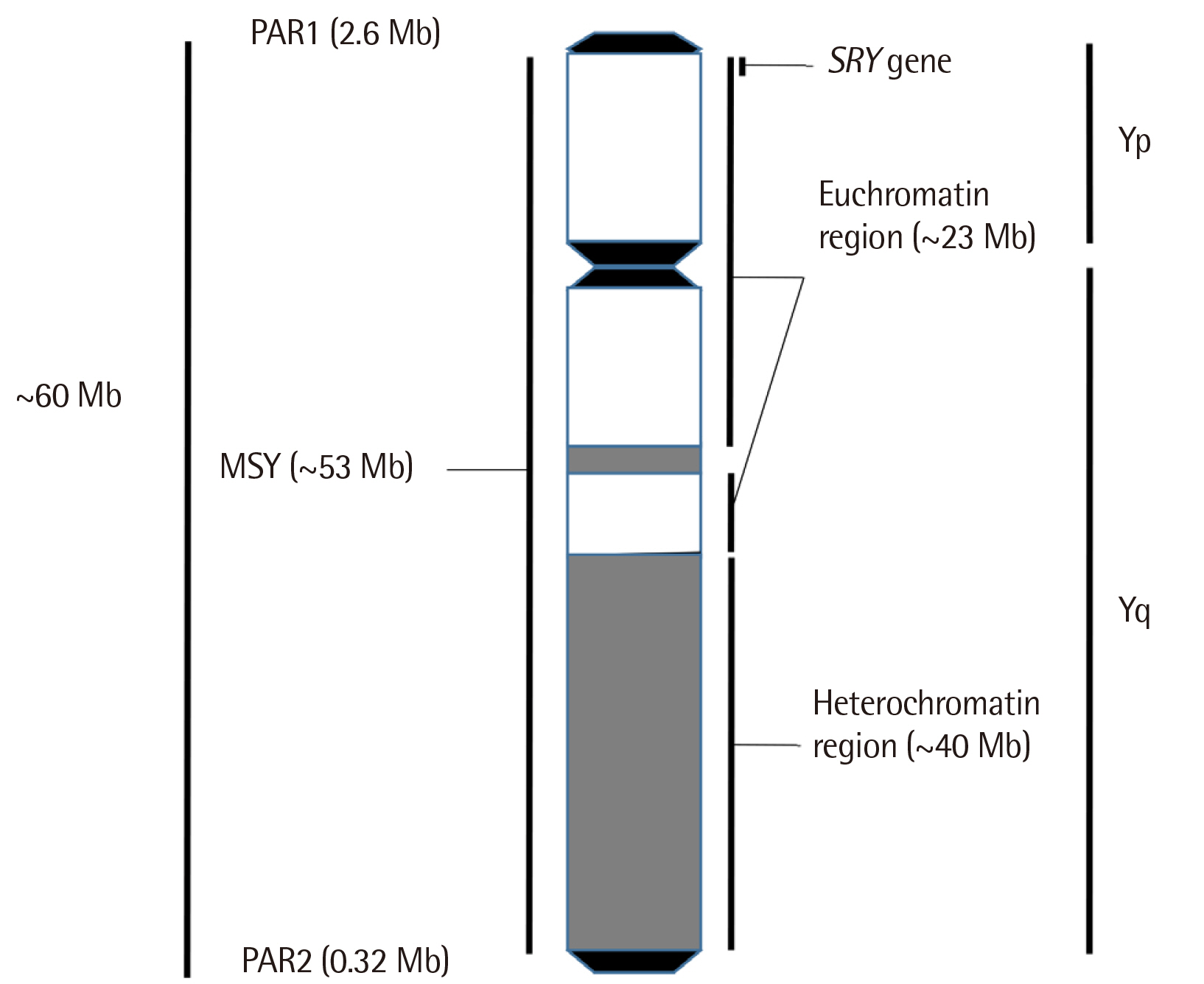Lab Med Online.
2021 Oct;11(4):230-234. 10.47429/lmo.2021.11.4.230.
Significance of Y Chromosome Loss in Hematologic Malignancies
- Affiliations
-
- 1Department of Laboratory Medicine, Dong-A University Hospital, Busan, Korea
- KMID: 2526081
- DOI: http://doi.org/10.47429/lmo.2021.11.4.230
Abstract
- Loss of chromosome Y (-Y) is one of the most common somatic genomic alterations in the male hematopoietic system. However, it has been widely debated whether -Y is an aging-related phenomenon or a disease-associated abnormality. Literature reviews, recent molecular genetic findings, and cytogenetic data obtained from the Dong-A University Hospital over the last 12 years supported that 75–100% of metaphases with isolated -Y were primarily associated with myeloid malignancies, including myelodysplastic syndrome. Thus, we need to monitor the frequency of -Y in patients with unexplained causes of anemia or cytopenia. We observed that in our hospital, more than 75% of -Y cases were diagnosed in patients with non-Hodgkin lymphoma or multiple myeloma, raising concerns on the disease development process when considering the increasing prevalence of these diseases in the aging population. -Y in peripheral blood has been associated with an increased risk of mortality, lower life expectancy, autoimmune disorders, cardiovascular diseases, diabetes, and hematologic malignancies. Y chromosome genes are known to be expressed in reproductive tissues. Therefore, it is crucial to maintain a regulated balance between the expression of X and Y homolog genes for men to remain healthy.
Figure
Reference
-
1. Van Dyke DL. 2001; -Y, Y loss in leukemia. Atlas Genet Cytogenet Oncol Haematol. 5:56–7.2. Ouseph MM, Hasserjian RP, Dal Cin P, Lovitch SB, Steensma DP, Nardi V, et al. 2021; Genomic alterations in patients with somatic loss of the Y chromosome as the sole cytogenetic finding in bone marrow cells. Haematologica. 106:555–64. DOI: 10.3324/haematol.2019.240689. PMID: 32193254. PMCID: PMC7849577.3. Thompson DJ, Genovese G, Halvardson J, Ulirsch JC, Wright DJ, Terao C, et al. 2019; Genetic predisposition to mosaic Y chromosome loss in blood. Nature. 575:652–7. DOI: 10.1038/s41586-019-1765-3. PMID: 31748747. PMCID: PMC6887549.4. Danielsson M, Halvardson J, Davies H, Torabi Moghadam B, Mattisson J, Rychlicka-Buniowska E, et al. 2020; Longitudinal changes in the frequency of mosaic chromosome Y loss in peripheral blood cells of aging men varies profoundly between individuals. Eur J Hum Genet. 28:349–57. DOI: 10.1038/s41431-019-0533-z. PMID: 31654039. PMCID: PMC7028735.
Article5. Lau YC. 2020; Y chromosome in health and diseases. Cell Biosci. 10:97. DOI: 10.1186/s13578-020-00452-w. PMID: 32817785. PMCID: PMC7427063.
Article6. Graham EJ, Vermeulen M, Vardarajan B, Bennett D, De Jager P, Pearse RV 2nd, et al. 2019; Somatic mosaicism of sex chromosomes in the blood and brain. Brain Res. 1721:146345. DOI: 10.1016/j.brainres.2019.146345. PMID: 31348909. PMCID: PMC6717667.
Article7. Forsberg LA. 2017; Loss of chromosome Y (LOY) in blood cells is associated with increased risk for disease and mortality in aging men. Hum Genet. 136:657–63. DOI: 10.1007/s00439-017-1799-2. PMID: 28424864. PMCID: PMC5418310.
Article8. Guo X, Dai X, Zhou T, Wang H, Ni J, Xue J, et al. 2020; Mosaic loss of human Y chromosome: what, how and why. Hum Genet. 139:421–46. DOI: 10.1007/s00439-020-02114-w. PMID: 32020362.
Article9. Godfrey AK, Naqvi S, Chmátal L, Chick JM, Mitchell RN, Gygi SP, et al. 2020; Quantitative analysis of Y-chromosome gene expression across 36 human tissues. Genome Res. 30:860–73. DOI: 10.1101/gr.261248.120. PMID: 32461223. PMCID: PMC7370882.
Article10. HGNC (HUGO Gene Nomenclature Committee). https://www.genenames.org. Last accessed on June 2012.11. Kido T, Lau YF. 2015; Roles of the Y chromosome genes in human cancers. Asian J Androl. 17:373–80. DOI: 10.4103/1008-682X.150842. PMID: 25814157. PMCID: PMC4430935.12. Wiktor A, Rybicki BA, Piao ZS, Shurafa M, Barthel B, Maeda K, et al. 2000; Clinical significance of Y chromosome loss in hematologic disease. Genes Chromosomes Cancer. 27:11–6. DOI: 10.1002/(SICI)1098-2264(200001)27:1<11::AID-GCC2>3.0.CO;2-I. PMID: 10564581.
Article13. Zhang LJ, Shin ES, Yu ZX, Li SB. 2007; Molecular genetic evidence of Y chromosome loss in male patients with hematological disorders. Chin Med J. 120:2002–5. DOI: 10.1097/00029330-200711020-00012. PMID: 18067786.
Article14. Wiktor AE, Van Dyke DL, Hodnefield JM, Eckel-Passow J, Hanson CA. 2011; The significance of isolated Y chromosome loss in bone marrow metaphase cells from males over age 50 years. Leuk Res. 35:1297–300. DOI: 10.1016/j.leukres.2011.05.002. PMID: 21703685.
Article15. Shahrabi S, Khodadi E, Saba F, Shahjahani M, Saki N. 2018; Sex chromosome changes in leukemia: cytogenetics and molecular aspects. Hematology. 23:139–47. DOI: 10.1080/10245332.2017.1375063. PMID: 28889783.
Article16. Wong AK, Fang B, Zhang L, Guo X, Lee S, Schreck R. 2008; Loss of the Y chromosome: an age-related or clonal phenomenon in acute myelogenous leukemia/myelodysplastic syndrome? Arch Pathol Lab Med. 132:1329–32. DOI: 10.5858/2008-132-1329-LOTYCA. PMID: 18684036.
Article17. Greenberg PL, Tuechler H, Schanz J, Sanz G, Garcia-Manero G, Solé F, et al. 2012; Revised international prognostic scoring system for myelodysplastic syndromes. Blood. 120:2454–65. DOI: 10.1182/blood-2012-03-420489. PMID: 22740453. PMCID: PMC4425443.
Article18. Ganster C, Kämpfe D, Jung K, Braulke F, Shirneshan K, Machherndl-Spandl S, et al. 2015; New data shed light on Y-loss-related pathogenesis in myelodysplastic syndromes. Genes Chromosomes Cancer. 54:717–24. DOI: 10.1002/gcc.22282. PMID: 26394808.
Article19. Nomdedeu M, Pereira A, Calvo X, Colomer J, Sole F, Arias A, et al. 2017; Clinical and biological significance of isolated Y chromosome loss in myelodysplastic syndromes and chronic myelomonocytic leukemia. A report from the Spanish MDS Group. Leuk Res. 63:85–9. DOI: 10.1016/j.leukres.2017.10.011. PMID: 29121539.
Article20. Hasserjian RP, Orazi A, et al. Swerdlow SH, Campo E, editors. 2017. Myelodysplastic syndromes: overview. WHO classification of tumours of haematopoietic and lymphoid tissues. 4th ed. International Agency for Research on Cancer;Lyon, France: p. 98–106.21. Loftfield E, Zhou W, Yeager M, Chanock SJ, Freedman ND, Machiela M. 2019; Mosaic Y loss is moderately associated with solid tumor risk. Cancer Res. 79:461–6. DOI: 10.1158/0008-5472.CAN-18-2566. PMID: 30510122. PMCID: PMC6359954.
Article
- Full Text Links
- Actions
-
Cited
- CITED
-
- Close
- Share
- Similar articles
-
- Incidence and Types of Constitutional Chromosomal Abnormalities in Patients with Hematologic Malignancies
- Incidence and Clinical Significance of Sex Chromosome Losses in Bone Marrow of Patients with Hematologic Diseases
- Cytogenetically Unrelated Clones in Hematologic Malignancies
- False Homozygosity Results in HLA Genotyping due to Loss of Chromosome 6 in a Patient with Acute Lymphoblastic Leukemia
- Illness Experience of Adolescents with Hematologic Malignancies


